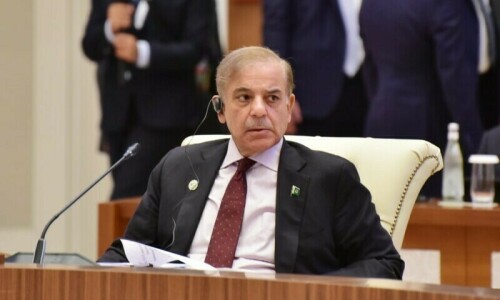 ISLAMABAD, Dec 14: They say museums are hallmarks of a civilised society. For those who are not aware, Islamabad has a few museums which the city can be proud of.
ISLAMABAD, Dec 14: They say museums are hallmarks of a civilised society. For those who are not aware, Islamabad has a few museums which the city can be proud of.
The Heritage Museum at Lok Virsa or the Museum of Archeology that is temporarily housed in the Sir Syed Memorial building is a safe haven of beauty and contemplation that restores the soul.
Hidden in the wilderness of Shakarparyan Hills, it is yet another public space which is more than just your backyard attraction. Boasting more than 350,000 species of animals, plants, fossils, rocks and minerals, the Pakistan Museum of Natural History (PMNH) helps us understand who we are – its collections show us the historical context that shaped our present.
Recording naturally-evolved history, the museum collects and preserves natural heritage. It features a variety of exhibits bound to fascinate the visitors.
Inspiring interpretations and understanding, the museum’s galleries offer virtual tours of the solar system, help comprehend Earth’s fury through active volcanic eruptions, and display mechanical dinosaurs -- the T-Rex and a couple of others – and numerous attractions that come with audio and visual aid.
 By touching the ‘Virtual Tour’ icon, the visitors get an idea of the exhibits in various galleries of the museum.
By touching the ‘Virtual Tour’ icon, the visitors get an idea of the exhibits in various galleries of the museum.
There is the Paleo Gallery -- based on the pre-historic wildlife of Pakistan -- where fossil collection from all over the country is displayed. Some of the fossils are as old as 650 million years.
Similarly, there is the Eco Gallery which provides basic information about earth, zoological and botanical sciences. Small dioramas have been displayed at the gallery for the interest of children.
Gemstone Gallery and Biodiversity Gallery provide information to visitors about flora and fauna of Pakistan while Tethy’s Gallery gives details through visuals about the salt range, ocean life and minerals. It also houses a skeleton of a whale.
The visitors can also access ‘World of Natural History’ through an icon and receive information about the natural wealth of the country, including plants, animals, birds, minerals, gemstones, fossils and rocks.
 There is also a ‘Kids Corner’ where children can explore the world of natural history through various games. In the ‘Discovery Room’ children find a huge tree trunk where they learn to calculate the age of a tree by counting its annual rings; and also about weather conditions from the gaps between the annual rings.
There is also a ‘Kids Corner’ where children can explore the world of natural history through various games. In the ‘Discovery Room’ children find a huge tree trunk where they learn to calculate the age of a tree by counting its annual rings; and also about weather conditions from the gaps between the annual rings.
“We are trying to properly design exhibitions because people today, especially children, show lesser interest in static displays,” said one of the museum officials. “This is why we have gone hi-tech to provide hands on displays with audio and visuals, incorporating modern technology,” he said.
It is imperative to have informal educational centres with formal education such as museums or science centres, he added.
However, the official said lot more could have been exhibited but lack of space and funds were the main hindrances to it.
“Museums are treasure houses. If the government can’t provide more, it should at least improve the ones we already have,” he said.













































Dear visitor, the comments section is undergoing an overhaul and will return soon.